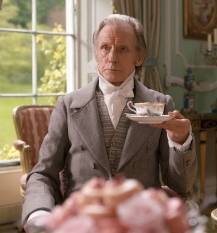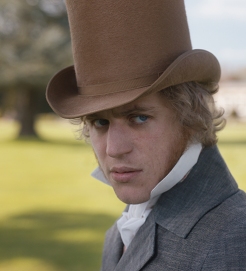New version of Jane Austin classic is dizzily entertaining pre-Tinder rom-com

Emma.
Starring Anya Taylor-Joy, Bill Nighy, Mia Goth & Johnny Flynn
Directed by Autumn de Wilde
PG
In theaters Friday, Feb. 21, 2020
A precocious young woman meddles in matchmaking, causing several romantic misadventures. Sound familiar?
It certainly should, especially if you’ve seen many movie rom-coms—or read any Jane Austen. The roots of this particular rom-com go back more than 200 years, to Austen’s social satire Emma, the last novel the British author published before her death in 1817.
Austin didn’t get much acclaim for her work during her lifetime, but her six main novels—including Emma, Pride and Prejudice and Sense and Sensibility—have been part of the pop-cultural mainstream for decades. Emma, which went on to become one of her most popular books, has been adapted for TV miniseries and films half a dozen times since 1948.
This latest version stars Anya Taylor-Joy as the 20-year-old Emma, the indulged, beautiful, somewhat spoiled but good-hearted mistress of Hartfield manor, where she lives with her father, the perpetually perturbed Mr. Woodhouse (veteran British actor Bill Nighy), and a host of scurrying servants. As the movie opens, Emma is preparing for the wedding of her live-in governess, a romantic match-up she’s convinced she made happen.

Bill Nighy
As she and her father head to the church, Mr. Woodhouse cautions Emma about continuing to meddle in others’ romantic affairs. “You must not make matches,” he tells her, “or foretell things.”
Emma barely pays him any attention. “It’s a great amusement,” she says.
It’s certainly a great amusement to watch as Emma continues to meddle and muddle things for her friends and neighbors, and herself.
First-time feature director Autumn de Wilde—whose background is mostly in still photography and music video—certainly knows about the importance of visuals. The movie is a hyper-stylized, sumptuously watchable parade of vibrant colors, ornate excess and preening, extravagant fashions and customs of Britain’s Regency era, especially as it slices into the upper-class comedy of manners of Emma and her social circle. It also takes some of the pomp out of the pomp and circumstance of the times, showing characters emerging occasionally from behind stiff, starched collars, from underneath their fluffy, puffy gowns, out of skin-tight breeches and tailcoats, or in other private moments to reveal glimpses their true selves.
And in moments like that, you realize that some things about romance—and people in general—never change, whether it’s in England centuries ago, in America today, or anywhere, everywhere, at all levels of society.

Johnny Flynn
It’s terrific to see Taylor-Joy—best known for the horror flicks The Witch and Split—shine in a sunnier role where she’s not fighting for her life, terrified half to death or making an unholy pact with the devil. She’s surrounded by a tapestry of colorful supporting characters. Mia Goth is Harriett, a wide-eyed student at a local boarding school whom Emma befriends and mentors; Harriett adores Emma, soaks up her advice and views her as something of a goddess on a pedestal—quite literally, at one point. There’s the handsome heartthrob neighbor Mr. Knightley (Johnny Flynn, who played young Albert Einstein on TV’s Genius) and the ever-elusive bachelor Frank Churchill (Callum Turner), due to inherit his aunt’s vast estate, perhaps sooner rather than later. Josh O’Connor (he was Prince Charles on The Crown) is the local pastor.
Miranda Hart plays blabbery Miss Bates, the town matron who can’t seem to stop talking, especially about her talented niece (Amber Anderson).
Who’ll hook up with whom in this 19th century English-countryside version of OKCupid, this pre-Tinder tale of bonnets, bustles, pretty boys, manors and maidens?
Like the novel on which it’s based, Emma. (styled, with a period at the end) intends to satirize—not particularly glamorize—its subjects and its time period, an era in which society and people were starkly divided into haves and have-nots, and one in which a young woman’s highest aspiration often was to find a well-off husband. It’s whimsical without being campy, witty but never wacky, fluffy instead of stuffy and romantic with just enough bite to leave a mark.
Perhaps the period in the title is meant to remind us that it is, after all, a period-piece—a fanciful film based on a story set in a specific time period, about characters who look, think and act the way they do because they’re products of that time and place. The characters in this movie certainly fit that description; they’re wealthy white “landed gentry,” most of whom don’t have to worry a bit about money. In that era, in that environment, it’s easy to see how Emma could turn out to be the way she is, become who she is.
“I’ve been unpardonably vain and insufferably arrogant,” she says at one point, after thoughtlessly wounding someone with a careless comment. Love can hurt, and the carriage ride to romance can be bumpy, leaving you shivering alone in the winter snow or slobbering in the summer sun with a bloody nose. Even good-intentioned matchmaking can sometimes make a real mess of things.
But it all works out—and gets sorted out, with laughter as well as tears—in the end. It has for years, across time and through all the other versions of Jane Austen’s well-worn tale, and it does once again in this delightfully snazzy, dizzily entertaining, snappy-looking period-piece rom-com.